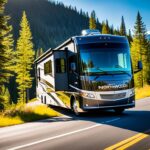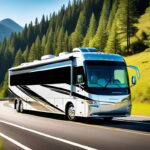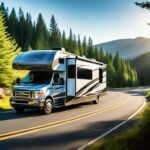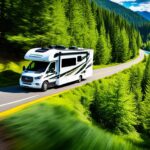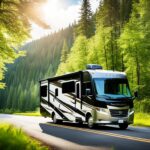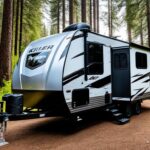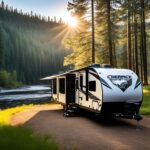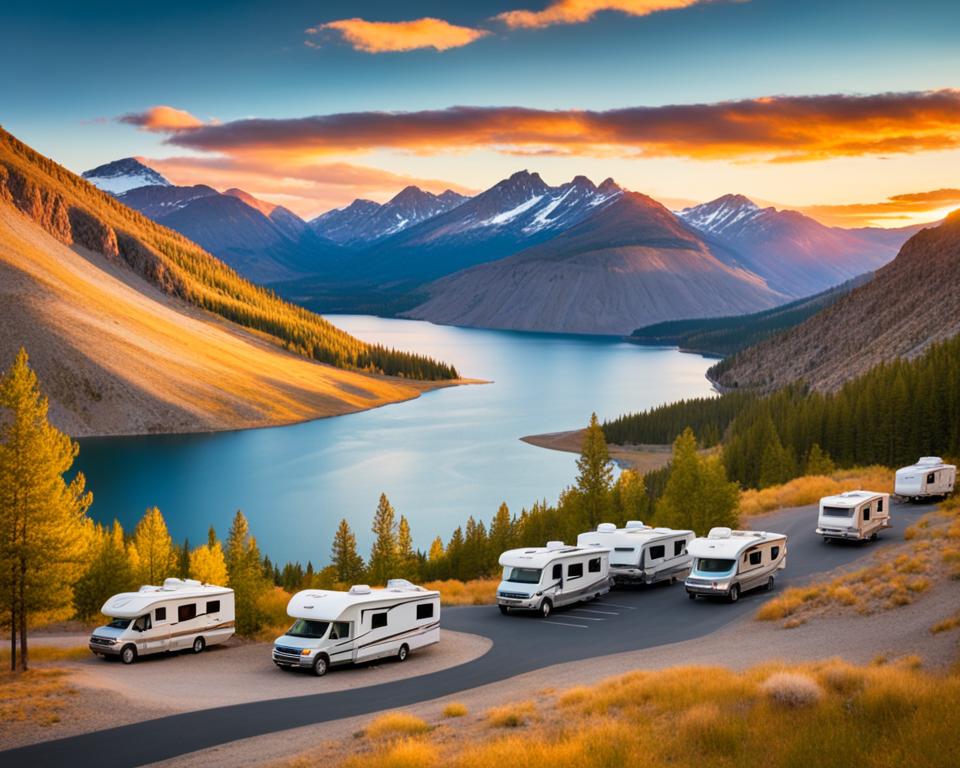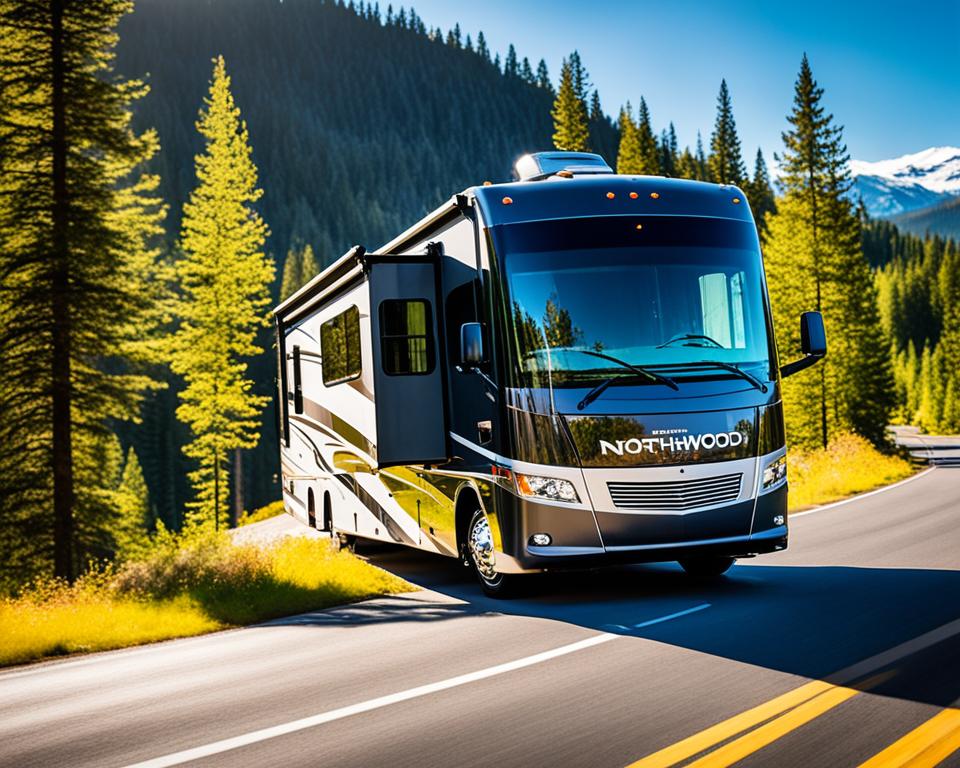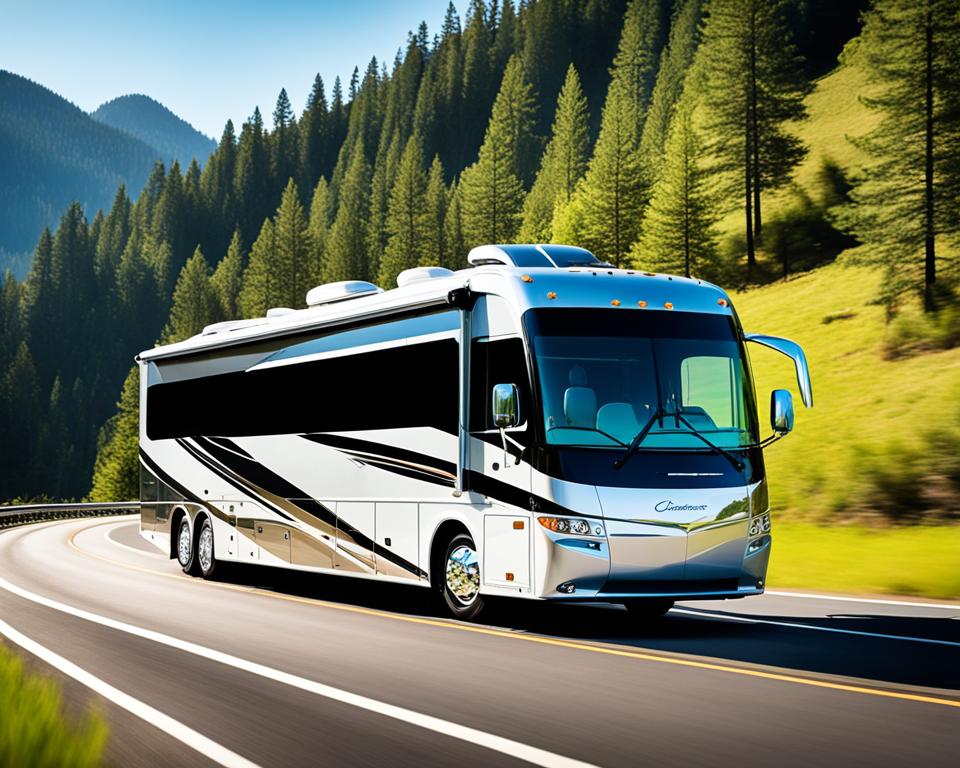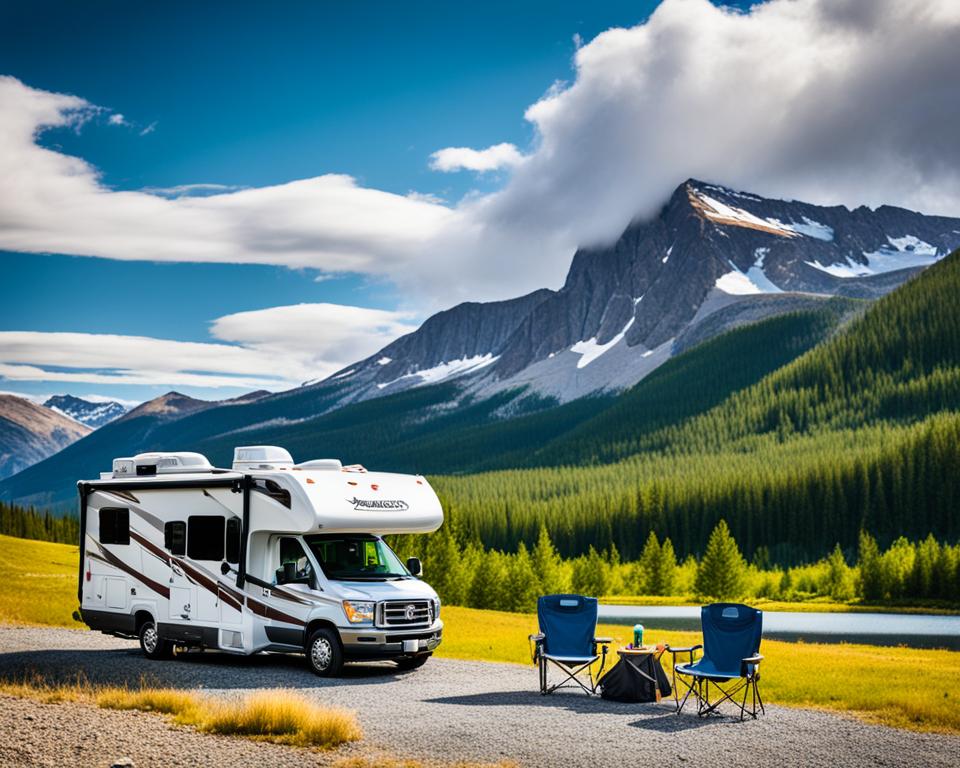RV maintenance is crucial for ensuring the reliability and longevity of your RV. Whether you’re a beginner or an experienced RVer, following a maintenance checklist can help you stay on top of essential tasks. This checklist will cover pre-trip, monthly, seasonal, and annual maintenance activities, ensuring that your RV is in optimal condition for your adventures.
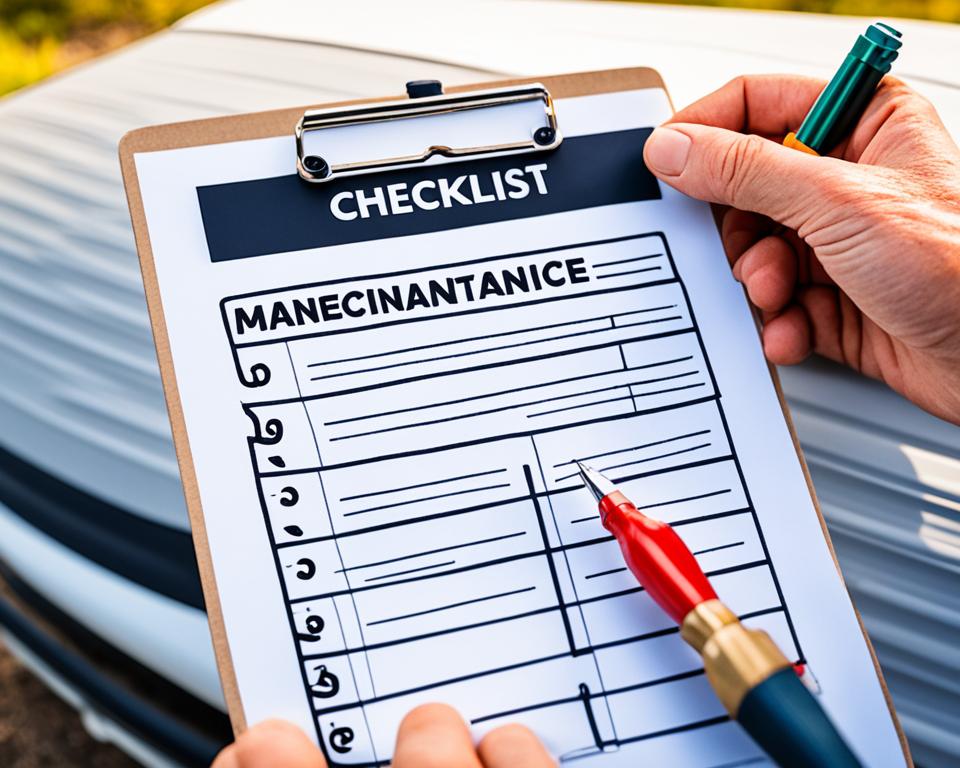
Key Takeaways:
- Performing regular maintenance on your RV is important for keeping it in good shape.
- Pre-trip maintenance should be done before every trip to ensure everything is in working order.
- Monthly, seasonal, and annual maintenance tasks help prevent costly repairs down the line.
- Checking and maintaining RV amenities is essential for comfort and convenience on the road.
- Read RV manuals and follow safety precautions to ensure proper maintenance and avoid warranty issues.
How often should you check your RV for repairs?
Regular maintenance is crucial for keeping your RV in good shape and ensuring its longevity. By conducting both regular maintenance on a fixed schedule and pre-trip maintenance before every trip, you can stay on top of any potential repairs or issues. In addition, performing monthly, annual, and seasonal maintenance is essential to address specific needs and conditions that may arise. This comprehensive approach to RV maintenance will ensure that your vehicle is always ready and reliable for your adventures on the road.
| Maintenance Type | Frequency |
|---|---|
| Regular Maintenance | Fixed schedule |
| Pre-trip Maintenance | Before every trip |
| Monthly Maintenance | Once a month |
| Annual Maintenance | Once a year |
| Seasonal Maintenance | Twice a year |
Regular maintenance on a fixed schedule involves routine checks and inspections to identify any issues early on. Pre-trip maintenance ensures that your RV is in optimal condition before hitting the road. Monthly maintenance addresses ongoing care and minor repairs, while annual and seasonal maintenance focuses on specific needs depending on the time of the year. By following these maintenance routines, you can give your RV the attention it needs to prevent major repairs and keep it in top-notch condition.
It’s important to note that hot- and cold-weather maintenance should be given special attention. Extreme temperatures can affect certain components of your RV, such as batteries, tire pressure, and cooling systems. Taking the necessary steps to protect and maintain your RV in various weather conditions will help extend its lifespan and ensure a comfortable and safe travel experience.
Remember, proper and regular maintenance saves you time, money, and unnecessary stress on the road. By investing the time and effort into caring for your RV, you’ll enjoy worry-free travels and make the most out of your RV adventures.
Pre-trip maintenance
Before every trip, it’s crucial to perform pre-trip maintenance on your RV. This ensures that everything is in working order and reduces the risk of issues while on the road. To help you with your pre-trip maintenance, here’s a checklist of tasks to complete:
Inside the RV:
- Turn off and secure all appliances to prevent damage during travel.
- Close and lock all windows and cabinets to secure items inside.
- Secure all large items to prevent movement while driving.
Outside the RV:
- Check the jacks and ensure they’re in good condition.
- Remove and store chocks used for stabilizing the RV.
- Inspect all lights and brakes to ensure they’re functioning properly.
- Inspect the tires for any signs of wear or damage.
- Check and secure the awning to prevent damage from wind.
By following this pre-trip maintenance checklist, you can have peace of mind knowing that your RV is ready for the journey ahead. Remember, regular maintenance is key to ensuring a smooth and enjoyable trip.
Monthly RV maintenance
Regular maintenance is key to keeping your RV in optimal condition. By performing monthly checks and upkeep, you can ensure that your seals, systems, and safety equipment are working properly. This proactive approach helps prevent costly repairs and keeps your RV ready for your next adventure.
Here are some essential monthly RV maintenance tasks:
- Check and repair seals: Inspect all seals on windows, doors, and compartments. Look for cracks, gaps, or signs of wear and tear. Repair or replace any damaged seals to prevent leaks.
- Monitor wet-cell battery water levels: Check the water levels in your wet-cell batteries and top them off as needed to ensure proper function and longevity.
- Vacuum and clean AC vents and ducts: Keep your air conditioning system running smoothly by regularly cleaning vents and ducts to remove dust and debris.
- Run the generator: Run your RV’s generator for at least 30 minutes each month to maintain its performance and prevent any issues due to inactivity.
- Check and top off fluid levels: Regularly inspect and replenish fluid levels, including engine oil, transmission fluid, coolant, windshield washer fluid, and hydraulic fluids.
- Clean the A/C unit: Clean the air conditioner condenser coils and fins to improve efficiency and airflow.
- Test detectors: Test smoke detectors, carbon monoxide detectors, and propane leak detectors to ensure they are functioning correctly and replace batteries as needed.
- Check for pests: Inspect your RV for any signs of pests such as rodents or insects. Take necessary steps to prevent infestations and address any issues promptly.
By following this monthly RV maintenance checklist, you’ll keep your RV in great shape and minimize the chances of unexpected breakdowns. Remember, a little preventive maintenance goes a long way!
Seasonal/Semi-Annual RV maintenance
Regular maintenance is crucial for keeping your RV in top shape. In addition to pre-trip and monthly maintenance, seasonal or semi-annual maintenance plays a vital role in ensuring the longevity and optimal performance of your RV. This maintenance routine involves a series of tasks that help protect your RV from damage, maintain its appearance, and enhance its overall functionality.
Exterior Maintenance
One of the essential aspects of seasonal RV maintenance is taking care of the exterior. Begin by thoroughly washing and waxing the RV to remove dirt, grime, and any accumulated residue. This not only improves the aesthetics but also serves as a protective barrier against the elements. Consider using specialized RV cleaning products to avoid damaging the exterior finish.
Next, pay attention to the awning. Clean it thoroughly to remove any accumulated debris or stains, and then apply a protective wax or sealant. This helps prolong its lifespan and prevents the growth of mold or mildew.
Finally, consider getting an oil change for your RV. Regularly changing the oil ensures that your engine operates smoothly and efficiently, minimizing the risk of potential issues.
Interior Maintenance
Deep cleaning the interior is another crucial component of seasonal RV maintenance. Start by thoroughly vacuuming and dusting all surfaces, including the floors, walls, and furniture. Pay close attention to hidden corners and crevices to eliminate any dirt or allergens.
Additionally, clean and condition any upholstery or fabric surfaces, ensuring they remain in good condition. Disinfect countertops, appliances, and other frequently-touched areas to maintain a clean and hygienic living environment inside your RV.
Mechanical Maintenance
Mechanical maintenance is an essential part of seasonal RV care. It involves checking and changing motorhome fluids, such as coolant, brake fluid, and engine oil. These fluids play a crucial role in maintaining the proper functioning of various systems in your RV.
While performing seasonal maintenance, it’s also a good idea to weigh your RV to ensure you’re within safe weight limits. This helps prevent unnecessary strain on your RV’s mechanical components and ensures optimal performance on the road.
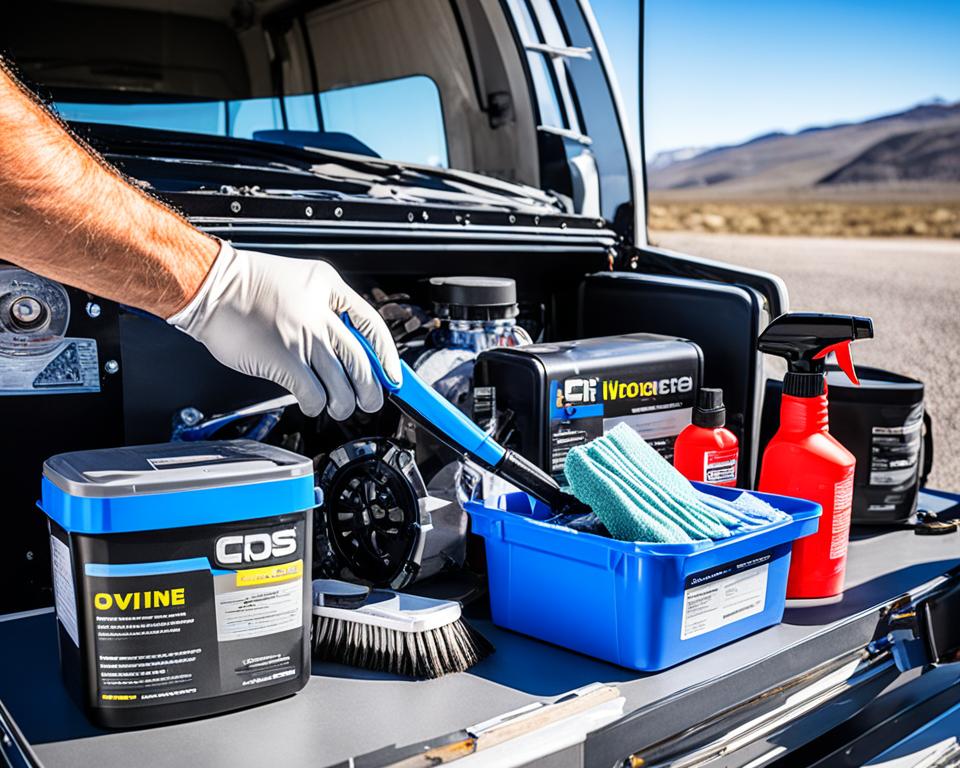
By following a regular seasonal or semi-annual maintenance routine, you can protect your RV investment and enjoy worry-free adventures on the road. Remember to consult your RV’s owner’s manual for specific maintenance guidelines and recommendations tailored to your vehicle.
Yearly RV maintenance
Yearly maintenance is crucial for maintaining the overall condition and performance of your RV. By following a comprehensive maintenance routine, you can address any potential issues before they become major problems and keep your RV in excellent shape for years to come.
Here is a breakdown of the essential yearly maintenance tasks for your RV:
- Inspect and Replace Seals: Check all the seals on your RV, including window seals, roof seals, and door seals. Replace any damaged or worn-out seals to prevent leaks and maintain a watertight interior.
- Clean and Lubricate Slide-Outs: Properly clean and lubricate the slide-outs to ensure smooth operation and prevent any sticking or jamming.
- Check Batteries: Inspect and test the batteries in your RV. Replace any dead or weak batteries to ensure reliable power supply during your adventures.
- Inspect Hoses and Fluid Levels: Check all hoses, including the water and propane hoses, for signs of wear or damage. Also, inspect and top off fluid levels in your RV, such as engine oil, transmission fluid, and coolant.
- Run and Service the Generator: Start and run the generator to ensure it’s in proper working condition. Change the oil and filter as per the manufacturer’s recommendations, and inspect the belts, connections, and fuel lines.
- General Interior Cleaning: Perform a deep clean of the interior of your RV, including vacuuming, dusting, and sanitizing surfaces. Pay special attention to areas prone to mold and mildew.
- Exterior Inspection and Maintenance: Inspect the exterior of your RV for any signs of damage, such as cracks or dents. Clean and wax the exterior to protect the paint and finish from the elements.
- Check and Test Safety Equipment: Test all safety equipment in your RV, including smoke detectors, carbon monoxide detectors, and fire extinguishers. Replace any expired or malfunctioning safety devices.
Completing these yearly maintenance tasks will help keep your RV in optimal condition and ensure a smooth and enjoyable camping experience. By proactively addressing any potential issues, you can prevent costly repairs and extend the lifespan of your RV.
Remember, consistent maintenance is key to the longevity and reliability of your RV. Stay tuned for the next section on essential RV amenities to ensure your camping trips are comfortable and hassle-free.
Essential RV amenities
Regular maintenance of your RV includes not only checking vital systems but also ensuring that your RV amenities are in proper working order. Properly functioning amenities contribute to your comfort and convenience while on the road.
Below is a list of essential RV amenities that you should regularly check and service:
- Furnace: Inspect and clean the furnace to ensure efficient heating during colder seasons.
- Water Pump: Check the water pump for any leaks or irregularities and ensure proper water flow throughout your RV.
- Refrigerator: Clean and check the refrigerator’s cooling unit, seals, and ventilation to maintain optimal temperature and food freshness.
- Water Heater: Inspect and service the water heater to ensure a consistent supply of hot water for your daily needs.
- Pilot Lights: Check the pilot lights on appliances that require them, such as the stove or oven, to ensure they ignite properly.
- Antenna: Inspect and maintain your RV’s antenna to ensure a strong and clear TV signal while on the road.
- Roof Vents: Clean and inspect roof vents to ensure proper ventilation and prevent any blockages.
Regularly inspecting and maintaining these amenities will help you avoid any unexpected issues and enjoy a comfortable and hassle-free RV experience.
To provide you with a visual reference, here is an image of a well-maintained RV amenity, a properly functioning refrigerator:
Remember, a well-maintained RV with properly functioning amenities enhances your overall travel experience and ensures a memorable adventure.
Reading RV manuals
Before embarking on your RV adventures, it’s essential to familiarize yourself with the RV manuals that come with your vehicle. These manuals serve as valuable resources for understanding the basic operation, maintenance, and warranty information specific to your RV. By taking the time to read through these manuals, you can ensure that you have the knowledge necessary to properly maintain your RV and avoid any potential warranty issues.
RV manuals provide detailed instructions on how to operate the various systems and components of your RV. They cover topics such as electrical systems, plumbing, HVAC, appliances, chassis, and more. Understanding how these systems work and how to maintain them can help you prevent breakdowns, troubleshoot issues, and ensure the longevity of your RV.
When reading the RV manuals, pay particular attention to the sections on maintenance. These sections provide important guidelines and schedules for routine maintenance tasks, such as checking fluid levels, inspecting seals, lubricating moving parts, and more. Following these maintenance recommendations is crucial for keeping your RV in optimal condition and avoiding costly repairs in the future.
Furthermore, understanding the warranty information in the RV manuals is vital. The warranty outlines the coverage provided by the manufacturer and any conditions or limitations that may apply. By being aware of the warranty terms, you can take the necessary steps to comply with the requirements and protect your warranty rights.
Reading the RV manuals not only helps you become familiar with your RV’s operation and maintenance but also empowers you to make informed decisions regarding its care and upkeep. It allows you to take a proactive approach to RV maintenance and ensure that your investment remains protected for years to come.
Safety precautions and gear
When it comes to RV maintenance, prioritizing safety is crucial. By following proper safety precautions and using the right gear, you can ensure your well-being while working on or around your RV. Here are some essential safety tips to keep in mind:
- Wear appropriate safety gear: Always wear gloves and goggles when working with tools or chemicals. These protective accessories can help prevent injuries and shield your eyes and hands from potential hazards.
- Follow proper lifting techniques: When lifting heavy objects or equipment, use proper lifting techniques to avoid strains or injuries. Bend your knees, keep your back straight, and lift with your legs rather than your back.
- Be aware of potential hazards: Before you start any maintenance tasks, identify and mitigate potential hazards in your RV’s surroundings. Look for trip hazards, sharp edges, or any other safety concerns that may pose a risk while working.
By taking these safety measures, you can create a safer environment and minimize the risk of accidents or injuries while performing RV maintenance tasks.
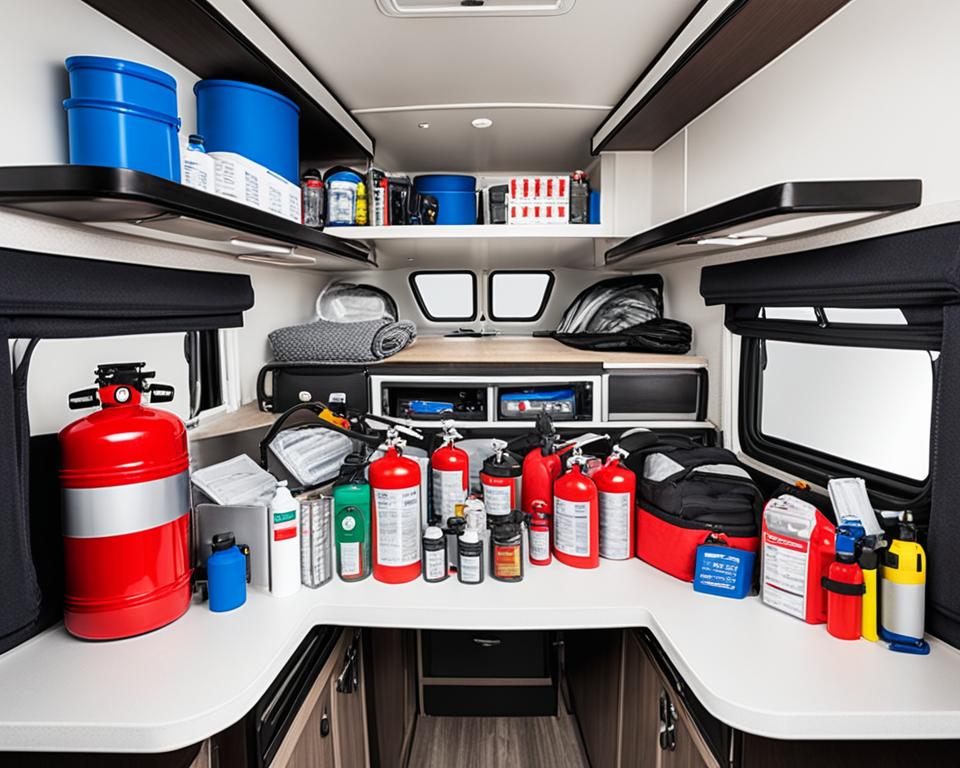
Conclusion
Regular RV maintenance is crucial for ensuring the reliability and longevity of your RV. By following a comprehensive maintenance checklist that covers pre-trip, monthly, seasonal, and annual tasks, you can keep your RV in optimal condition and minimize the risk of unexpected breakdowns.
Whether you’re a beginner or an experienced RVer, prioritizing maintenance is key to enjoying hassle-free travels and getting the most out of your RV adventures.
Remember to perform pre-trip maintenance before every journey, conduct monthly checks to keep your seals and systems in good shape, and schedule seasonal and yearly maintenance to address any potential issues. Additionally, don’t forget to regularly inspect and maintain essential RV amenities to ensure your comfort and convenience on the road.
By making RV maintenance a priority and following the appropriate checks and procedures, you can have peace of mind knowing that your RV is ready for the road and that you’ll have many memorable journeys ahead.
FAQ
How often should you check your RV for repairs?
It’s recommended to conduct regular maintenance on a fixed schedule and pre-trip maintenance before every trip. Monthly, annual, and seasonal maintenance should also be performed. This comprehensive approach ensures that your RV is always in optimal condition.
What is involved in pre-trip maintenance?
Pre-trip maintenance includes a thorough examination both inside and outside of your RV. Inside, you should secure appliances, close windows and cabinets, and secure items. Outside, you should check jacks, lights, brakes, tires, awning, and more. Following a pre-trip checklist ensures everything is in working order.
What should be included in monthly RV maintenance?
Monthly maintenance involves checking and repairing seals, checking battery water levels, cleaning vents and ducts, running the generator, checking fluid levels, testing detectors, inspecting for pests, and more. These regular checks ensure your RV is in optimal condition.
What tasks should be performed for seasonal/semi-annual maintenance?
Seasonal maintenance tasks include washing and waxing the exterior, deep cleaning the interior, cleaning the awning, getting an oil change, weighing your RV, and checking and changing motorhome fluids. These tasks protect your RV and maintain its appearance and performance.
What should be included in yearly RV maintenance?
Yearly maintenance involves inspecting and replacing seals, cleaning and lubricating slide-outs, checking batteries, inspecting hoses and fluid levels, running and servicing the generator, and more. Yearly maintenance addresses potential issues and keeps your RV in excellent condition.
What should be checked for essential RV amenities?
Essential RV amenities include the furnace, water pump, refrigerator, water heater, pilot lights, antenna, roof vents, and more. Regularly inspecting and maintaining these amenities ensure your comfort and convenience on the road.
How important is it to read RV manuals?
It is essential to read all the RV manuals that come with your RV. Understanding how to use and maintain the systems specific to your RV is crucial for proper maintenance and avoiding any warranty issues.
What safety precautions and gear should be used during RV maintenance?
When performing any tasks on or around your RV, always prioritize safety. This includes wearing appropriate safety gear like gloves and goggles, using proper lifting techniques, and being aware of potential hazards. Safety measures ensure your well-being while performing maintenance tasks.
Why is regular RV maintenance important?
Regular RV maintenance is crucial for ensuring the reliability and longevity of your RV. By following a comprehensive maintenance checklist, you can keep your RV in optimal condition and minimize the risk of unexpected breakdowns, allowing you to enjoy hassle-free travels and get the most out of your adventures.


